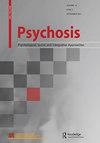Brief mindfulness-oriented interventions (MOIs) to improve psychiatric symptoms in a psychiatric inpatient unit: a randomized controlled feasibility trial
IF 1
4区 医学
Q4 PSYCHIATRY
Psychosis-Psychological Social and Integrative Approaches
Pub Date : 2021-11-22
DOI:10.1080/17522439.2021.1978530
引用次数: 1
Abstract
ABSTRACT Background Mindfulness-based interventions are effective in treating numerous psychiatric symptoms, but data about brief mindfulness-oriented intervention (MOI) use with psychiatric inpatients are limited. We investigated whether a brief MOI was feasible and effective in reducing psychosis and other symptoms in a psychiatric inpatient unit. Methods In an assessor-blinded feasibility randomized-controlled trial, adult psychiatric inpatients were randomized to the intervention or control group. Feasibility outcomes included enrollment rate, retention rate and intervention-completion rate. The quantitative outcome was the impact on symptom reduction (mean and % difference in Brief Psychiatric Rating Scale (BPRS) between baseline and 7-day follow-up scores). Exploratory outcomes included improvement in quality of sleep, mindfulness and quality of life. Qualitative intervention feedback was obtained from therapists and participants. Results Feasibility outcomes were 39.2% participant enrollment, 85% study completion and 81.8% intervention completion. No symptom outcomes significantly differed. There were no significant differences in exploratory outcomes. Interventionists reported system-level barriers in treatment delivery; patients subjectively reported enjoying the intervention. Discussion The MOI is feasible in the inpatient psychiatric setting. There were no significant effects on psychiatric symptoms during the follow-up period, but no adverse effects were reported. Therapeutic effects could be further investigated in longer-term interventions and larger confirmatory RCTs.以正念为导向的短期干预措施(MOI)改善精神病住院患者的精神症状:一项随机对照可行性试验
摘要背景基于正念的干预措施在治疗许多精神症状方面是有效的,但关于精神病住院患者使用短暂正念导向干预(MOI)的数据有限。我们调查了在精神病住院单元中,简短的MOI在减少精神病和其他症状方面是否可行和有效。方法在评估者盲法可行性随机对照试验中,成年精神病住院患者被随机分为干预组或对照组。可行性结果包括入组率、保留率和干预完成率。定量结果是对症状减轻的影响(基线和7天随访评分之间的简明精神病评定量表(BPRS)的平均值和%差异)。探索性结果包括睡眠质量、正念和生活质量的改善。从治疗师和参与者那里获得了定性干预反馈。结果可行性结果为39.2%的参与者参与,85%的研究完成,81.8%的干预完成。无明显差异的症状结果。在探索结果上没有显著差异。干预专家报告说,在提供治疗方面存在系统层面的障碍;患者主观上表示喜欢干预。讨论MOI在住院精神科环境中是可行的。在随访期间,对精神症状没有显著影响,但没有不良反应报告。治疗效果可以在长期干预和更大规模的验证性随机对照试验中进一步研究。
本文章由计算机程序翻译,如有差异,请以英文原文为准。
求助全文
约1分钟内获得全文
求助全文
来源期刊
CiteScore
2.20
自引率
8.30%
发文量
36

 求助内容:
求助内容: 应助结果提醒方式:
应助结果提醒方式:


